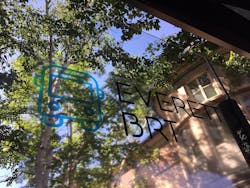MA: Everett Becomes First Local City to Speed Bus Commute with Raised Platforms
The city of Everett became the first city in Massachusetts to install elevated platforms that will make it easier for riders to board buses travelling through one of the busiest corridors in the city. New platforms and ramps installed at two bus stops in Everett Square will enable bus riders with wheelchairs, strollers, or carts to board the bus faster, speeding up commutes for the 10,000 riders on Broadway, the city’s main thoroughfare into Boston.
With level boarding and additional improvements to its bus stations and traffic signals, Everett is building on its rush hour bus-only lane on Broadway, which made national headlines in 2016. The EverettBRT pilot, launched in collaboration with the MBTA and with funding from the Barr Foundation, establishes the city as a leader among a group of ambitious municipal leaders piloting elements of Gold Standard bus rapid transit.
“As one of the few area cities without rail access, we know how important it is for our streets to move people more efficiently,” said Mayor Carlo DeMaria. “We’ve had such great success in piloting the dedicated bus lane on Broadway and are excited and grateful to the MBTA and Barr Foundation for their assistance to further improve this busway.”
“We appreciate the leadership and partnership of Mayor Carlo DeMaria, other City of Everett officials, business leaders, residents and the Barr Foundation to improve public transit,” said Transportation Secretary and CEO Stephanie Pollack. “Everett continues to be an example of how communities and the MBTA can deliver better bus service by working together. MassDOT and the MBTA stand ready to work with Everett and any other community wishing to improve the public transit customer experience.”
“We applaud the city of Everett’s continued commitment to improving the bus commute and Mayor DeMaria’s leadership in embracing innovations in bus service that can improve the customer experience,” said MBTA General Manager Luis M. Ramirez. “Coupled with the success of the bus-only lane on Broadway, these accessible platforms and ramps help passengers board more quickly and easily, allowing for shorter travel times for buses. We’re pleased to be able to partner with Everett during this level-boarding pilot and thank the Barr Foundation for making it possible.”
“Mayor DeMaria is fearless. By focusing on BRT, he has made the city of Everett a transportation leader,” said Mary Skelton Roberts, co-director of climate for the Barr Foundation. “Gold Standard BRT, which include elements such as covered stations, dedicated lanes, signal priority, off-board fare collection, and level boarding is long overdue in Greater Boston. I am excited to see municipalities taking up the challenge of getting us closer to it. With this pilot, Everett joins other visionary cities such as Bogota, Mexico City, and more recently Albuquerque in acknowledging that Gold Standard Bus Rapid Transit minimizes congestion, increases foot traffic for local businesses, and provides a better experience for bus riders. I hope that other municipal leaders will step up and follow Everett’s lead.”
Along with boarding platforms that are level with bus entrances and exits, the city is testing sensor-equipped traffic signals that prioritize buses, turning green as the vehicles approach key intersections. City officials will collect data on performance improvements during the pilot, anticipating that it will build upon the success of the dedicated lane, which dropped average travel time from Everett Square to Downtown Boston by more than 20 percent.
The level boarding and traffic-signal priority will benefit MBTA Routes 97, 104, 109, 110, and 112.
Just two miles from downtown Boston, Everett is the only neighboring municipality without a rapid transit line or direct access to Boston. With ridership on Upper Broadway bus lines projected to increase by more than 25 percent by 2040, moving Everett’s bus system in the direction of BRT is key to establishing Broadway as one of Greater Boston’s best transit corridors, and securing Everett as a growing hub for housing and business development. The pilot is part of a long-term Everett Transit Action Plan, which includes major service and route improvements, transit investments, and bike and pedestrian access.
"Fixing the 'last mile' is often cited as an important goal for transportation agencies and advocates to improve how people get from their transit stop to final destination. Adding boarding-level platforms in Everett shows a commitment to the 'last six inches,' too," said Wendy Landman, executive director of WalkBoston. "These last six inches are critical elements of age and disability-friendly communities, growing bus ridership, and improving mobility for all community members."
The pilot, made possible by a $100,000 grant from the Barr Foundation, will also include several placemaking enhancements — such as decorated shelters, “clean graffiti,” LED and digital displays, and a pedicab food truck — to engage riders and passersby along the route.
EverettBRT is the first of three regional bus rapid transit pilots taking place in 2018. Later this year, the city of Cambridge and town of Watertown will partner to improve bus routes on Mount Auburn Street, including an all-day dedicated bus lane. Beginning in October, the Town of Arlington will test BRT features on the three-mile #77 bus route along Massachusetts Avenue, which has the highest ridership in Arlington and is one of the top 15 highest-ridership routes in the overall MBTA bus system.
